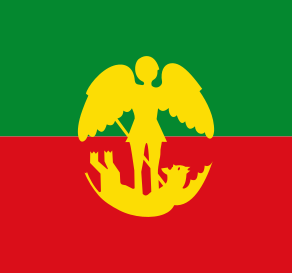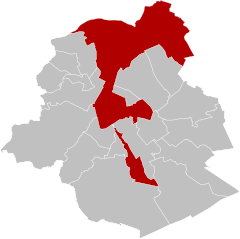City of Brussels
City of Brussels
| |
|---|---|
City and municipality | |
 Panorama of the city centre from the Mont des Arts/Kunstberg | |
| Coordinates: 50°50′48″N 04°21′09″E / 50.84667°N 4.35250°E | |
| Country | |
| Community | Flemish Community French Community |
| Region | Brussels-Capital |
| Arrondissement | Brussels-Capital |
| Government | |
| • Mayor (list) | Philippe Close (PS) |
| • Governing party/ies | PS - Ecolo / Groen, DéFI - Forward |
| Area | |
• Total | 33.09 km2 (12.78 sq mi) |
| Population (2022-01-01)[1] | |
• Total | 188,737 |
| • Density | 5,700/km2 (15,000/sq mi) |
| Postal codes | 1000, 1020, 1030, 1040, 1050, 1120, 1130 |
| NIS code | 21004 |
| Area codes | 02 |
| Website | www.brussels.be |
The City of Brussels[a] is the largest municipality and historical centre of the Brussels-Capital Region, as well as the capital of the Flemish Region (from which it is separate) and Belgium.[2] The City of Brussels is also the administrative centre of the European Union, as it hosts a number of principal EU institutions in its European Quarter.[3][4][b]
Besides the central historic town located within the Pentagon, the City of Brussels covers some of the city's immediate outskirts within the greater Brussels-Capital Region, namely the former municipalities of Haren, Laeken, and Neder-Over-Heembeek to the north, as well as the Avenue Louise/Louizalaan and the Bois de la Cambre/Ter Kamerenbos park to the south-east, where it borders municipalities in Flanders.
As of 1 January 2023[update], the City of Brussels had a population of 194,291 inhabitants. The total area is 33.09 km2 (12.78 sq mi) which gives a population density of 5,704/km2 (14,770/sq mi). As of 2007, there were 75,998 registered non-Belgians in the City.[5] In common with all of Brussels' municipalities, it is legally bilingual (French–Dutch).
Territorial history
[edit]
Historically, the City of Brussels was simply defined, being the area within the second walls of Brussels, the modern-day Small Ring (Brussels' inner ring road). As the city grew, the surrounding villages grew as well, eventually growing into a contiguous city, though the local governments retained control of their respective areas.
The construction of the Avenue Louise/Louizalaan was commissioned in 1847 as a monumental avenue bordered by chestnut trees that would allow easy access to the popular recreational area of the Bois de la Cambre/Ter Kamerenbos. However, fierce resistance to the project was put up by the town of Ixelles—then, as now, a separate municipality (local authority) from the City of Brussels—through whose territory the avenue was to run. After years of fruitless negotiations, Brussels finally annexed the narrow band of land needed for the avenue, in addition to the Bois de la Cambre itself, in 1864. That decision accounts for the unusual shape of today's City of Brussels and for the separation of Ixelles into two separate areas.
Unlike most of the municipalities in Belgium, the ones now located in the Brussels-Capital Region were not merged with others during mergers occurring in 1964, 1970, and 1975.[6] However, a few neighbouring municipalities have been merged into the City of Brussels, including Haren, Laeken and Neder-Over-Heembeek in 1921.[7] These comprise the northern bulge in the municipality. To the south-east is the above-mentioned strip of land along the Avenue Louise that was annexed from Ixelles. Part of the Université libre de Bruxelles (ULB)'s Solbosch campus is also part of the City of Brussels, partially accounting for the bulge in the south-eastern end.
Demographics
[edit]Foreign population
[edit]The City of Brussels has a large immigrant population, with both the EU and non-European migrant communities outnumbering the native Belgians. Akin to neighbouring Ixelles, Etterbeek and Schaerbeek, the City of Brussels also has a large Muslim population, mainly of North African origin.
As of 2023[update], taking into account the nationality of birth of the parents, 55.84% of the City of Brussels's population is of non-European origin (predominantly Moroccan, Indian and Congolese), 27.21% is of European origin other than Belgian (mainly French, Romanian, Italian, Spanish, and Polish), while 16.94% is solely of native Belgian ancestry.[8] Among all major migrant groups from outside the EU, a majority of the permanent residents have acquired Belgian nationality.[9]
Migrant communities in the City of Brussels with over 1,000 people as of 1 January 2020:[10]
| 9,049 | |
| 7,431 | |
| 7,057 | |
| 5,175 | |
| 4,690 | |
| 2,777 | |
| 1,832 | |
| 1,758 | |
| 1,704 | |
| 1,591 | |
| 1,573 | |
| 1,565 | |
| 1,511 | |
| 1,389 | |
| 1,309 | |
| 1,177 |
| Group of origin | Year | |
|---|---|---|
| 2023[11][12] | ||
| Number | % | |
| Belgians with Belgian background | 32,916 | 16.94% |
| Belgians with foreign background | 85,377 | 43.94% |
| Neighbouring country | 4,194 | 2.16% |
| EU27 (excluding neighbouring country) | 6,629 | 3.41% |
| Outside EU 27 | 74,554 | 38.37% |
| Non-Belgians | 75,998 | 39.12% |
| Neighbouring country | 13,512 | 6.95% |
| EU27 (excluding neighbouring country) | 28,534 | 14.69% |
| Outside EU 27 | 33,952 | 17.47% |
| Total | 194,291 | 100% |
Politics
[edit]As in every other Belgian municipality, the City of Brussels is headed by a mayor, who should not be confused with the Minister-President of the Brussels-Capital Region or the Governor of Brussels-Capital. The current city council was elected in the October 2018 elections.[13] The current mayor of the City of Brussels is Philippe Close, a member of PS, who is in coalition on the municipal council with Ecolo - Groen, DéFI and Forward.[14]
 | ||||||||||
| Party | ||||||||||
|---|---|---|---|---|---|---|---|---|---|---|
| Votes | % | Swing (pp) | Elected 2018 |
Change | ||||||
| PS | 19,997 | 28.38 | 17 / 49 (35%)
|
|||||||
| Ecolo - Groen | 11,847 | 16.81 | 9 / 49 (18%)
|
|||||||
| MR - Open Vld | 9,772 | 13.87 | 7 / 49 (14%)
|
|||||||
| PVDA-PTB | 8,159 | 11.58 | 6 / 49 (12%)
|
|||||||
| cdH - CD&V | 6,543 | 9.29 | 5 / 49 (10%)
|
|||||||
| DéFI | 5,317 | 7.55 | 3 / 49 (6%)
|
|||||||
| N-VA | 2,606 | 3.70 | 1 / 49 (2%)
|
|||||||
| Vooruit (Change Brussels) | 2,269 | 3.22 | New | 1 / 49 (2%)
|
||||||
| Vlaams Belang | 1,138 | 1.61 | 0 / 49 (0%)
|
- | ||||||
| ISLAM (political party) | 1,125 | 1.60 | 0 / 49 (0%)
|
- | ||||||
| Others | 1,694 | 2.40 | 0 / 49 (0%)
|
- | ||||||
Environmental policy
[edit]Brussels is ranked sixth in the index of cities which are becoming greener fastest as for the year 2022, even though in the past it had a reputation of a "traffic-choked city of high rises and concrete". The authorities released a plan composed of seven steps on how to make the city even more sustainable. Those include introducing "a use-based, circular and low-carbon economy" and making the city "proactive". The city should become a "10-minute city" meaning "making the facilities essential to urban life accessible to every inhabitant in less than 10 minutes". Green spaces should be expanded. The plan includes participation of the population in decision-making and high life level for all.[15]
Culture
[edit]Museums
[edit]There are many museums in and around Brussels' city centre. On the first Sunday of every month, free entry is granted to many of Brussels' museums.
Below is a non-exhaustive list of museums in the City of Brussels:
- Royal Museums of Art and History :
- Royal Museums of Fine Arts of Belgium :
- Royal Museum of the Armed Forces and Military History
Food
[edit]Brussels is well known for its food. Brussels sprouts were named after the city.[16] Like most of Belgium, moules-frites, waffles (gaufres), chocolate, French fries, and beer are common there.[17] It is home to one 2-starred and four 1-starred Michelin restaurants.[18]
Honorary citizens
[edit]Among the recipients of the honorary citizenship of the City of Brussels are:[19]
| Date | Name | Notes |
|---|---|---|
| 29 June 1945 | Dwight D. Eisenhower | |
| 12 September 1945 | Bernard Law Montgomery, 1st Viscount Montgomery of Alamein | |
| 11 October 1945 | Charles de Gaulle | |
| 16 October 1945 | Sir Winston Churchill | |
| 16 April 1946 | Sir Arthur Coningham | |
| 26 May 1982 | Simone Veil | |
| 5 October 1984 | Maurice Béjart | |
| 24 April 1985 | Gaston Thorn | |
| 20 December 2001 | José Géal | |
| 8 September 2004 | Annie Cordy | |
| 18 May 2005 | José Van Dam | |
| 22 June 2005 | Marc Sleen | |
| 23 September 2005 | Alberto Uderzo | |
| 24 November 2005 | Jacques Van der Biest | |
| 20 December 2005 | Dick Annegarn | |
| 4 Februari 2006 | Guy Loiseau | President of the Order of the Friends of Manneken Pis[19] |
| 22 March 2006 | Marcel Hastir | |
| 12 June 2006 | Henri Vernes | |
| 24 June 2006 | Bernard Foccroulle | |
| 19 October 2006 | Jean-Baptiste Beken | Compagnon de Saint-Laurent[19] |
| 14 November 2006 | Cécile Muller | President of Miss Belgium |
| 5 May 2007 | Elisabeth t'Kint | Manager of the Cirque Royal[19] |
| 7 May 2007 | Julot Verbeeck | Press officer of the Cirque Royal[19] |
| 17 April 2008 | Expo 58 hostesses | |
| 12 October 2009 | William Vance | |
| 24 February 2010 | David Susskind (1925–2011) | Belgian Jewish Leader and Peace Activist.[20][21] |
| 12 May 2011 | Stéphane Hessel | |
| 22 November 2011 | Jean Van Hamme | |
| 25 September 2013 | Agnès Varda | |
| 29 March 2014 | Nathan Clumeck | Professor and managing director of the Saint-Pierre Hospital |
| 30 October 2015 | Grand Jojo | Also known as Lange Jojo |
| 25 March 2016 | Woltje | Puppet from the Royal Theatre Toone |
| 22 September 2017 | Arno | |
| 27 September 2018 | Diane von Fürstenberg |
Symbols
[edit]Heraldry
[edit]
|
|
| Previous versions | |
|---|---|
| The Original arms were plain Gules.[23] From the 16th century on, it was customary to put the figure of the city seal representing Saint Michael, first as a shadow then in a more elaborate form.[24]
Note: many of the arms of the Seven Noble Houses of Brussels were variants of these arms. | |

|
1730 arms |
| Napoleonic arms[25] | |
Vexillology
[edit]| Flag of the City of Brussels | |
|---|---|
 |
Description:
Green and red with at its centre Saint Michael slaying the dragon (Devil). Symbolism: Saint Michael is the patron saint of the city.[26] See: Saint Michael slaying the Devil |
See also
[edit]- Transport in Brussels
- Timeline of Brussels
- Bourgeois of Brussels
- Seven Noble Houses of Brussels
- Guilds of Brussels
References
[edit]Footnotes
[edit]- ^ French: Ville de Bruxelles [vil də bʁysɛl] or alternatively Bruxelles-Ville [bʁysɛl vil]; Dutch: Stad Brussel [stɑd ˈbrʏsəl] or Brussel-Stad [ˌbrʏsəl ˈstɑt]
- ^ Brussels is not formally declared capital of the EU, though its position is spelled out in the Treaty of Amsterdam.
Citations
[edit]- ^ "Bevolking per gemeente op 1 januari 2022". Statbel.
- ^ The Belgian Constitution (PDF). Brussels, Belgium: Belgian House of Representatives. May 2014. p. 63. Archived from the original (PDF) on 10 August 2015. Retrieved 10 September 2015.
- ^ Demey 2007.
- ^ "Protocol (No 6) on the location of the seats of the institutions and of certain bodies, offices, agencies and departments of the European Union, Consolidated version of the Treaty on the Functioning of the European Union, OJ C 83, 30.3.2010, p. 265–265". EUR-Lex. 30 March 2010. Archived from the original on 8 July 2012. Retrieved 3 August 2010.
- ^ "Immigration Office | IBZ".
- ^ Picavet, Georges (29 April 2003). "Municipalities (1795-now)". Georges Picavet. Retrieved 5 April 2009.
- ^ "Brussels Capital-Region". Georges Picavet. 4 June 2005. Retrieved 5 April 2009.
- ^ "Origin | Statbel". statbel.fgov.be. Retrieved 4 July 2023.
- ^ "2.738.486 inwoners van vreemde afkomst in België op 01/01/2012" [2,738,486 inhabitants of foreign origin in Belgium on 01/01/2012]. Npdata.be (in Dutch). Archived from the original on 22 October 2019. Retrieved 12 March 2013.
- ^ "Nationalités | IBSA". ibsa.brussels. Retrieved 10 July 2023.
- ^ Statistics foreign population in Belgium by municipality (in French and Dutch only)
- ^ "Origin | Statbel". statbel.fgov.be. Retrieved 4 July 2023.
- ^ "Résultats officiels des élections communales 2018" (in French). Retrieved 17 July 2021.
- ^ "PS, Ecolo-Groen et sp.a ouvrent la majorité à Défi à la Ville de Bruxelles" (in French). 20 October 2018. Retrieved 17 July 2021.
- ^ Ann Hughes, Rebecca (22 December 2023). "10-minute city: How Brussels plans to become a pedestrian-friendly green hub". Euronews. Retrieved 7 January 2024.
- ^ "Real Food Encyclopedia | Brussels Sprouts". FoodPrint. Retrieved 9 February 2021.
- ^ 2venturists (10 June 2018). "What to Eat in Brussels Belgium". Venturists. Retrieved 8 February 2021.
{{cite web}}: CS1 maint: numeric names: authors list (link) - ^ "Brussels 2 Stars MICHELIN MICHELIN Restaurants – the MICHELIN Guide Belgium". MICHELIN Guide. Retrieved 8 February 2021.
- ^ a b c d e "Ereburgers". opendata.brussel.be (in Dutch). Retrieved 14 May 2022.
- ^ "City of Brussels". Archived from the original on 2 February 2017. Retrieved 20 September 2018.
- ^ "World Jewish Congress".
- ^ Netherlandish sculpture 1450-1550 by Paul Williamson 2002 ISBN 0-8109-6602-6 page 42
- ^ Guillaume Des Marez, "L'origine des armoiries de Bruxelles. Première phase: De gueules plain", in: Études inédites, Brussels, 1936, p. 111–113.
- ^ Louis Robyns de Schneidauer, La couronne comtale de la ville de Bruxelles, in Le Parchemin, Gendbrugge-lez-Gand, 1939 (March–April).
- ^ (en)Brussels[archive], on the Heraldry of the World website.
- ^ Netherlandish sculpture 1450-1550 by Paul Williamson 2002 ISBN 0-8109-6602-6 page 42
Bibliography
[edit]- Demey, Thierry (2007). Brussels, capital of Europe. S. Strange (trans.). Brussels: Badeaux. ISBN 978-2-9600414-6-0.
- Eggericx, Laure (1997). Les Boulevards du Centre. Bruxelles, ville d'Art et d'Histoire (in French). Vol. 20. Brussels: Centre d'information, de Documentation et d'Etude du Patrimoine.
External links
[edit]- Official website (in French, Dutch, and English)
- Official tourism website (in French, Dutch, English, German, Spanish, Italian, and Portuguese)
- Webcam Grand-Place Brussels
- Interactive map








